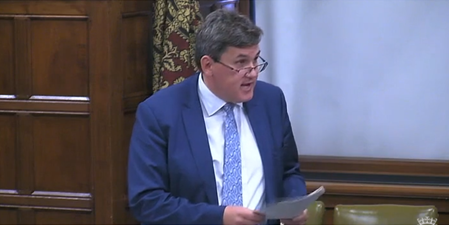It is a great pleasure to serve under a fellow Liverpudlian, Mr Hanson.
I rise to speak in this debate because, for me, Iran represents a fork in the road for British foreign policy. Yesterday, we saw highlighted starkly the limits of the isolation and damnation until the point of intervention policy of the past 20 years. Given that we cannot afford, militarily, socially or financially, to do the same again, our approach to Iran is critical.
Before I continue, I acknowledge and reiterate the fact that, for our own safety and for that of the Iranians, we cannot waver on the question of Iran gaining nuclear weapons. It needs to understand that working with the P5+1 is vital, because it is far better to deal with us in a rule-bound international system than to chance its hand with other, perhaps more powerful, nations in the region. For our own part, we cannot allow the Iranians to trigger a proliferation race across the whole middle east and add layer upon layer to existing nuclear states’ deterrence calculations. That would be a recipe for disaster, especially in a region where civilian control over military arsenals is imperfect and the experience of safety issues is less developed.
Following the deal, it was pleasing to see the reopening of the embassy and the risks of a nuclear standoff far more remote than we had feared a few years earlier. I, too, remember the cover of The Economist in February 2012, and the headline “Bombing Iran”. It seems that sanctions worked in Iran, but it could be argued that we saw their limits. They arguably forced the end of the Ahmadinejad Government and brought forward a more conciliatory one in Rouhani’s Government, but it is unrealistic to expect the people to blame only their own Government for their hardship and it is imprudent to weaken the position of Rouhani versus hardliners.
From now on, perhaps we should attempt to build bridges to generate good will. We need to change the calculation of interests in Tehran so that the costs of a combative approach are seen as being far greater than those of a co-operative one. Yes, that signal should be sent with strength and not appeasement, but it does require us not to be openly hostile. Progress can be made, and it should be, not least because we know that our own western liberal culture is a kind of benign Japanese knotweed. It is invasive, and it starts in no better place than at the intellectual level, in academia. Although we are right to acknowledge the regime’s oppressive treatment of academics and disregard for the principles of free speech and free exchange that are so vital to academic debate, Iran still has a highly educated population, as others have pointed out—I gather it has 97% literacy among the young—and the potential to reach and surpass its previous achievements is there, if we engage.
Some promising moves are already under way in academia. For example, the School of Oriental and African Studies has just introduced the option of an exchange or visit to Iran as part of a course; the University of Cambridge has just signed a direct exchange agreement with the embassy; the British Institute of Persian Studies has a Tehran institute; and SOAS and the Universities of Edinburgh, Oxford and St Andrews all now offer Persian at degree level. Such trusses of co-operation can help to build and strengthen the bridge of understanding between the UK and Iran, which can only aid relationships at a political level.
More of the same would be positive. We should not forget that President Rouhani himself is a product of the University of Glasgow and does not have the same hostility towards the UK as his predecessor. He speaks English with a Scottish accent—or so I am told. This is cheap diplomacy, but it can build links among people in our societies that enhance the level of understanding among Governments. Business links, tourism and investment will surely follow. I agree with my hon. Friend Mr Bacon that we cannot allow the US to declare itself the world’s financial policeman. Our firms should not fear US sanctions for following UK law.
If we acknowledge that our diplomacy can gradually change Iran and its stance towards the world, we must acknowledge at the same time that Iran has enormous influence in the middle east. Given how deeply it is in our interests to see a stable and prosperous middle east, and how great the costs of failure, as we are seeing, we cannot ignore the opportunity that engagement with Iran offers. Put simply, even if it seems to follow from our current configuration of alliances that we should be hostile, to be so would be to give in to “enemy of my enemy”, or rather “friend of my enemy is my enemy” thinking, in its crudest form.
(Intervention-Richard Bacon MP: Is my hon. Friend as surprised as I am that many people seem to be surprised that Iran would wish to exercise influence in its region? That is what all countries do in relation to their neighbours.)
It comes as no surprise to me, and of course it is reinforced by the hostile posture that the west has had thus far. Whenever we are hostile to countries—whether it is Russia or wherever—the first thing they do is turn inwards and look to their immediate region for defence. So it is no surprise that Iran has done the same.
As hon. Members have already said, Iran today is without doubt troublesome and destructive; some appalling things happen there. However, that will continue to happen and Iran will continue to be troublesome and destructive, even if we continue our tough line. Surely it cannot be in our interest to adopt an aggressive stance towards Iran at a time when there is an uncertain Saudi Arabian leadership transition, a worsening Syrian war and Russian aggression. The prize of a warmer relationship between Britain and Iran is too great not to try for it. The real prize is preventing Tehran’s alignment with Moscow from crystallising, and a de-escalation of the proxy fight between Iran and Saudi Arabia that has enflamed Syria, Iraq and Yemen. We should not take that alignment as set in stone, especially given that we have so much more to offer Iran than Russia or the Syrian Government do. We should try. Succeed, and the whole region starts to look very different and a less threatening place. One would not expect Saudi Arabia to be as confident without the west at its back. Détente between the two would beckon. Our relations with Lebanon would also improve. The resolve of Assad to win could diminish and with less backing for and more restraint of the Revolutionary Guard and Hezbollah, Israel, crucially, would be safer. That would be a great prize indeed, and a boon even if half-achieved.
Moving away from the arena of great power politics, however, one could also note that too much of the conversation about Iran today proceeds on the basis that the current Government are a temporary evil to be waited out. As in 2012, our rhetoric has failed to move on from Iraq, even if our belligerence has. We cannot expect Iran to trust us if we occasionally let slip that we would attack it if we felt sufficiently strong, brave or bored. In the Iranians’ calculation, the case for proliferation must look incredibly strong. In their position, we would do it, so we must change their position. Indeed, signalling, as the US did, that we have no intention of ever working with Iran was one of the most damaging errors the west has ever made, as my hon. Friend the Member for South Norfolk said. President Bush used absolutist language that had no place in state-to-state relations and, given our alignment with the US, we are implicated in that unhelpful position. That makes for a poor foundation for fruitful relations with a country of nearly 80 million people, most of whom hunger for engagement.
From the time of the revolution, Iran has been consistently portrayed as the regional “bad guy”; the west was even happy to excuse Saddam Hussein’s attacks upon it. However, as Lord Temple-Morris has noted in the other place, the bulk of ordinary Iranians want to be connected to the west and are not ideologically anti-American. They watch the BBC via illegal satellite dishes and I gather that in 2013 nearly 2 million of them voted by telephone in the Iranian version of “The X-Factor”, broadcast from the UK. The existence of this class—this plurality of voices—which we can help without over-offending the Government, steadily and carefully over the years to come can bring the change in Iran that the ayatollahs will find irresistible.

